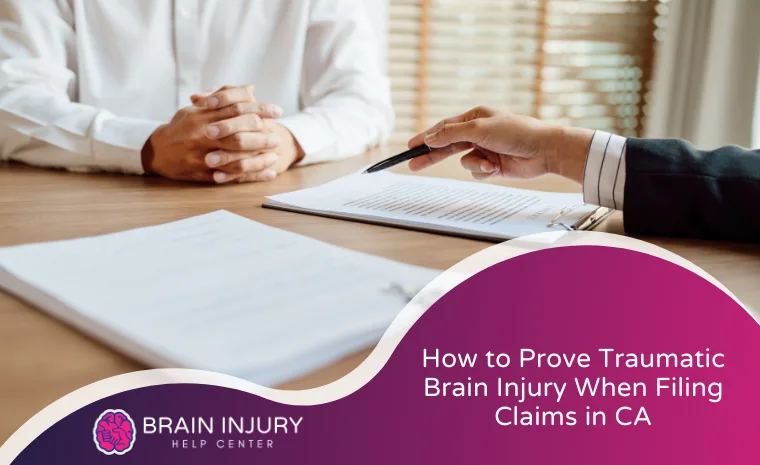Navigating the legal landscape surrounding traumatic brain injury (TBI) claims can be daunting. Victims of TBI often encounter formidable challenges when seeking compensation for their injuries, facing skepticism from insurance companies and the legal system alike. Proving the extent and impact of a severe injury requires meticulous documentation and expert testimony, underscoring the importance of building a robust case from the outset.
In California, establishing a strong foundation for a TBI claim is not only crucial for securing fair compensation but also for ensuring access to necessary medical care and support services. Understanding the intricacies of head injury claims in California is essential for anyone seeking justice and restitution in the aftermath of such a traumatic event.
Understanding TBI
A traumatic brain injury occurs when an external force disrupts normal brain tissue function. This can result from various incidents, including falls, motor vehicle crashes, sports injuries, gunshot wounds, or assaults. The severity of a TBI can range from mild, such as a concussion, to severe, causing long-term cognitive and physical impairments, like blood clots, double vision, slurred speech, poor impulse control, and memory loss.
Accurate diagnosis of TBI or axonal injury is essential, often requiring thorough medical evaluation and imaging tests like CT scans or magnetic resonance imaging (MRI). Symptoms may not always be immediately apparent, underscoring the need for emergency medical attention and ongoing monitoring. Documentation of this type of injury and its progression is vital for building a compelling case when filing claims, highlighting the impact on the victim’s daily activities and livelihood.
Types of Evidence for Proving TBI
When filing a claim for traumatic encephalopathy, presenting compelling evidence is essential to substantiate the severity and impact of the injury. Various types of evidence play critical roles in establishing the validity of the claim and securing fair compensation. Types of evidence include:
Medical Records
- Documentation of diagnostic tests such as CT scans, MRIs, or neurological assessments.
- Records of medical treatments received for the TBI, including surgeries, medications, and therapy sessions.
- Physician notes detailing symptoms, prognosis, and recommendations for ongoing care.
Expert Testimony
- Testimony from medical experts specializing in neurology or TBI rehabilitation, providing insights into the nature and consequences of the injury.
- Vocational experts can assess the impact of the TBI on the victim’s ability to work and earn a living.
Accident Reports
- Official reports documenting the circumstances surrounding the incident that caused the brain damage, such as car accidents, falls, or workplace injuries.
- Witness corroborating the events leading to the injury and establishing liability.
Additional Evidence
- Personal journals or diaries documenting the victim’s experiences, symptoms, and challenges following the traumatic brain injury.
- Testimony from friends, family members, or coworkers attest to changes in the victim’s behavior, cognitive function, or quality of life.
- Financial records illustrate the economic losses incurred due to medical expenses, lost wages, or diminished earning capacity.

The Role of Medical Professionals
Medical professionals play a pivotal role in proving traumatic brain injury claims at every stage of the process. Initially, they are instrumental in diagnosing a closed head injury through evaluation, which may include neurological exams and diagnostic imaging tests such as CT scans or MRIs. This initial diagnosis forms the foundation of the claim, providing essential documentation of the injury’s occurrence and severity.
Throughout treatment, medical professionals continue to contribute valuable evidence to support the TBI claim. They document the victim of TBI‘s medical history, treatment regimen, and progress, providing a comprehensive record of the injury’s impact on the individual’s health and well-being. Expert testimony from neurologists, neurosurgeons, or rehabilitation specialists can offer further insights into the nature and consequences of the TBI, strengthening the compensation case.
Traumatic Brain Injury Recovery: Why Legal Expertise Matters
Enlisting the services of a Los Angeles brain injury lawyer experienced in handling claims is critical. These legal professionals possess the expertise and resources necessary to navigate the intricacies of traumatic brain injuries in California, where the burden of proof can be particularly challenging, involving:
- Immediate Medical Attention: Visit a healthcare provider promptly after the injury occurs for an initial evaluation and diagnosis. Ensure all symptoms are documented in medical records.
- Diagnostic Imaging Tests: Obtain CT scans or MRIs to assess the extent of brain injury and provide objective evidence for the claim.
- Detailed Medical Records: Keep records of all medical treatments, prescriptions, therapies, and appointments related to the TBI.
- Witness Statements: Obtain statements from individuals who witnessed the incident leading to the TBI, documenting their observations and perspectives.
- Accident Reports: Secure official reports, such as police reports or workplace incident reports, detailing the circumstances surrounding the injury.
- Consults with Medical Experts: Seek opinions and assessments from specialists in neurology or TBI rehabilitation to provide expert testimony and insights into the injury’s nature and consequences.
- Documenting Personal Experiences: Maintain a personal journal or diary to record symptoms, challenges, additional damages, and progress following the TBI.
- Financial Records: Keep track of medical expenses, lost wages, and other financial losses incurred as a result of the TBI.
By presenting a robust collection of evidence, TBI claimants can effectively overcome challenges and establish the validity of their claims, ensuring they receive the compensation and support they rightfully deserve.
Conclusion
Navigating traumatic brain injury (TBI) claims in California can be complex, but building a strong case is essential for securing fair compensation and support. From collecting comprehensive evidence to overcoming challenges, TBI claimants must take proactive steps to assert their rights effectively.
Ultimately, seeking guidance from the medical professionals and legal experts at the Brain Injury Help Center is paramount, ensuring TBI victims that they will receive the support and compensation they deserve. Call us today for a free consultation.









